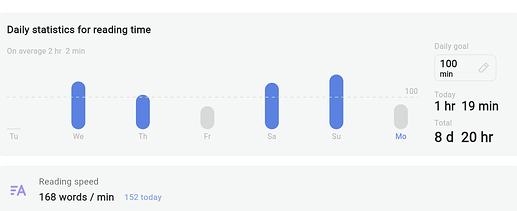I desperately want to figure out how my reading speed improves over time. I can definitely feel being faster but my statistics only show words read.
Could I suggest some feature somewhere if this is not already part of LingQ or is it available somewhere hidden?
My Frankenstein method would be to use tracking software, but I have an iPhone where the screentime stats delete every 2 weeks so I can’t go back in there. I tracked my desktop usage since I started LingQ, but with 50+% of my reading done on the phone I can’t make a reasonable estimate just from that.
I feel like this would be infinitely more useful than just knowing how much I’ve read in absolute numbers because without the time metric it’s not as useful to show definite improvement.
On that note, counting words is nice, but there should also be something to track characters read (I figure this would be easy since LingQ might already have this data) because between languages the amount of characters / words can vary wildly (eg. Japanese might have 2 characters / word on average, with english being closer to 5).
4 Likes
If i wanted to find that i always just timed myself reading a lesson and divided. just a dumb thought though, could you screenshot weekly or something so you keep track on your iPhone?
1 Like
Yeah I figure there are ways to do this, I was just hoping to remove barriers from reading. The whole reason that made LingQ so good for reading this past year was the complete package, I could just open it and start reading.
In the past when I tracked my reading speed I always stopped at some point because of the overhead of manually writing down or timing stuff. I’ll probably try this again but it’d be nice if LingQ added this to the statistics. Beyond ~10k words tracking my vocab starts feeling meaningless, but the reading speed stats would be a nice addition.
2 Likes
When I studied for exams I used pomodoro technique for time blocking. Close to the exam season I could accurately assess the amount of time and effort spent on each subject.
I suggest you do the same! i.e. track time that you spend with every component of the language, not just reading.
I’ve been using another app for reading since february, and it has to neat features -
Daily reading time, and reading speed. They help me assess the work that I put in. For example, when reading last Dune books I was cruising through with 200wpm, which made every 6k words partition exactly 30 minutes. Yet, while only starting a new book/author you might take some time to get accustomed to their choice of words, prose, etc
Btw, if you’re going to use pomodoro tracker, they had weekly report, like this -
1 Like
Are these metrics useful for assessing language acquisition?
I mean, I wear a magnifying eye glass over my optic ones. It allows me to see the text in larger text font. This option has improved my reading speed manyfolds. I read physical books very fast and less regression as well. Regardless of the writing style.
if i can read a 400 page book in 2 days with a magnifying glass for me that is an improvement when it comes to reading speed.
1 Like
Just wanted to update the thread. I opened a feature request thread on LingQ’s dev forum and within 2 weeks the reading speed section was added to the statistics page which was honestly a really positive surprise. It probably went that fast because LingQ already had the data, it just wasn’t displayed.
It also has the time spent learning now which I think was previously only noted for listening time.
Despite my feelings my reading speed didn’t change much over time, I had like ~50% improvement early on but then it mostly stagnates past that. More interesting was the noticeable dip each time I started a new novel, the sudden change in vocab/theme was enough to show up in the stats.
I hope it might be useful for others and big thanks to the devs for delivering at such a breakneck pace! 
3 Likes

